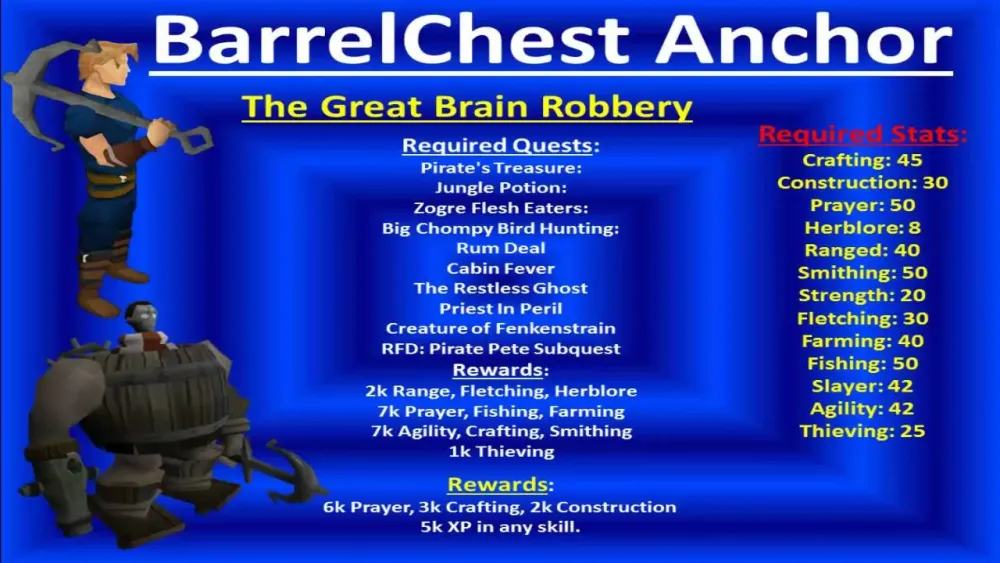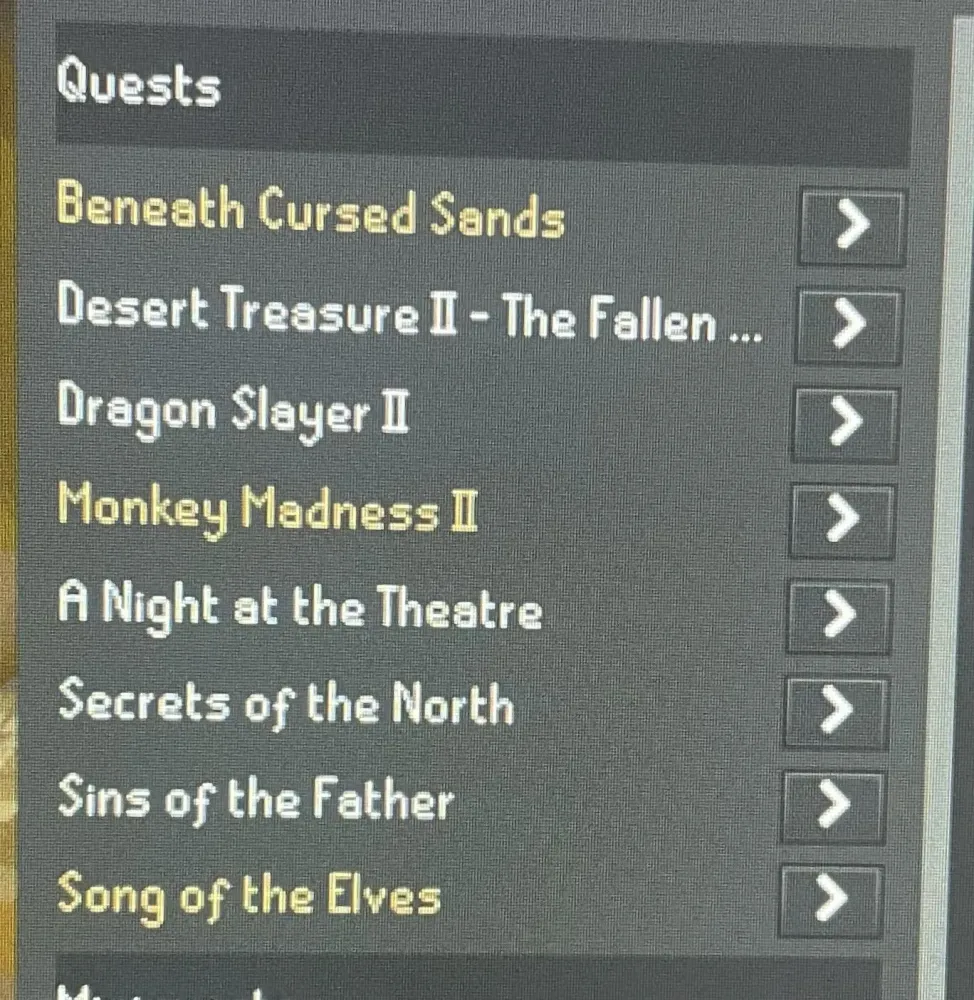Your cart is empty
Ultimate Guide to OSRS Quests: From Easy to Hard

Old School RuneScape (OSRS) quests offer players a rich narrative experience and a variety of challenges. These quests range from simple tasks suitable for beginners to complex adventures that require advanced skills and strategies. Completing quests not only enhances gameplay but also provides valuable rewards, including experience points, items, and access to new areas. This guide aims to provide an overview of OSRS quests, helping players navigate through them based on difficulty levels and personal preferences.
OSRS quests are categorized into different difficulty levels: easy, medium, hard, and elite. Each category is designed to cater to players with varying levels of experience and skill sets. Understanding these difficulty levels is crucial for players who wish to maximize their efficiency and enjoyment while completing quests.
Easy Quests: These quests are designed for novice players, often requiring minimal skill levels and straightforward objectives. They typically introduce players to the mechanics of questing, allowing them to familiarize themselves with the game’s narrative style. Examples of easy quests include “Cook’s Assistant” and “Sheep Shearer.” Completion of these quests rewards players with basic experience points and items, making them an excellent choice for new adventurers.
Medium Quests: As players progress, medium quests offer more engaging storylines and slightly increased complexity. These quests generally require a moderate skill level and may involve combat, puzzle-solving, or gathering specific items. Quests like “The Knight’s Sword” and “Animal Magnetism” fall into this category. Completing medium quests unlocks additional gameplay features, such as new areas and better items, providing a rewarding experience for players looking to advance their skills.
Hard Quests: Hard quests present a significant challenge, often requiring high skill levels, combat proficiency, and intricate problem-solving. Players must navigate through tough enemies and intricate storylines. “The Recipe for Disaster” and “Monkey Madness II” are prime examples of hard quests that demand both time and skill. The rewards for completing these quests are substantial, including access to powerful items, experience boosts, and new gameplay mechanics that enhance the overall experience.
Elite Quests: The pinnacle of questing in OSRS, elite quests are meant for the most experienced players. These quests involve complex narratives, high-level skills, and challenging combat scenarios. Examples include “Dragon Slayer II” and “A Taste of Hope.” Completing elite quests often yields substantial rewards, including unique items, large amounts of experience, and access to exclusive content. Players who tackle these quests demonstrate a profound understanding of the game’s mechanics and often gain recognition within the OSRS community.
In conclusion, understanding the different quest difficulty levels in OSRS can help players choose the right challenges based on their experience and skill. Whether you’re a newcomer looking to explore the game or a seasoned veteran seeking to conquer the toughest quests, there’s something for everyone in the world of OSRS quests.
Easy Quests for Beginners

If you’re new to Old School RuneScape (OSRS), starting your adventure with some easy quests can be a great way to familiarize yourself with the game mechanics and earn some early rewards. These quests are designed to be straightforward, requiring minimal skills and combat levels. Here’s a list of some easy quests that every beginner should consider:
- Cook’s Assistant: Help the Lumbridge chef gather ingredients for a cake. It’s a classic starter quest.
- Sheep Shearer: Assist a farmer by shearing sheep and delivering the wool. Simple and quick!
- Restless Ghost: Help a ghost find peace by returning his skull. It also rewards you with prayer experience.
- : A charming love story where you help two lovers unite. Expect some light-hearted fun!
- Death Plateau: Assist a group of mountain climbers and learn about the challenges of traversing steep terrains.
Completing these quests not only introduces you to the lore and world of Gielinor but also helps you gain vital experience points and items. Plus, they’re quick and engaging, making them perfect for newcomers. So grab your gear and get questing!
Moderate Quests to Challenge Your Skills
Once you’ve tackled the easy quests and feel more confident in your abilities, it’s time to take on some moderate quests that will test your skills and push your limits. These quests often require a bit more planning and strategy, but they also offer more substantial rewards and experience. Here are some noteworthy moderate quests to consider:
- The Knight’s Sword: A quest that combines exploration and combat as you retrieve a stolen sword for a knight.
- Animal Magnetism: Help a character gain their lost abilities while dealing with various animal challenges. You’ll also earn a useful item!
- Witch’s Potion: A quest focused on potion-making and problem-solving, where you assist a witch in creating a potion.
- Black Knights’ Fortress: A mix of combat and stealth as you infiltrate a fortress to recover stolen documents.
These quests not only enrich your gameplay experience but also improve your skills, making them essential for any aspiring adventurer. They often require specific levels in skills like combat, magic, or crafting, so be prepared to level up as you go. Dive into these challenges and see how far you can go!
Hard Quests for Experienced Players
If you’re an experienced player in Old School RuneScape (OSRS), you know that hard quests can offer both a challenge and a rewarding experience. These quests typically require a high skill level, extensive game knowledge, and often a good grasp of combat mechanics. Here are some of the most notable hard quests you should consider tackling:
- Dragon Slayer II – A sequel to the original Dragon Slayer, this quest is a rite of passage for many players. It involves defeating powerful dragons and solving intricate puzzles.
- Monkey Madness II – This quest sends you on a journey through Gielinor to aid the monkeys. Expect challenging combat and tricky platforming sections.
- Abyssal Sire – This quest not only requires you to defeat the Abyssal Sire but also to navigate through its unique mechanics, making it a true test of skill.
- Song of the Elves – As the conclusion to the Elf quest series, this quest opens up the Prifddinas city and requires high-level skills and knowledge of the game lore.
- Desperate Times – In this quest, you must confront the dark forces threatening the kingdom while working through a captivating storyline.
Completing these quests not only grants you valuable rewards, such as experience points and unique items, but they also deepen your understanding of the game’s lore and mechanics. So gear up, strategize, and prepare for an exhilarating challenge!
Tips for Completing Quests Efficiently
Completing quests in OSRS can sometimes feel overwhelming, especially if you’re aiming to finish them quickly. Here are some tried-and-true tips to help you streamline your questing experience:
- Read Guides: Use online resources, like the OSRS Wiki or video guides, to familiarize yourself with each quest’s requirements and walkthroughs.
- Plan Your Inventory: Before starting a quest, make sure your inventory is well-stocked with the necessary items, food, and potions. A well-prepared player is less likely to have to backtrack.
- Use Quest Helpers: Install quest helper plugins if you play on RuneLite or utilize in-game quest markers to keep track of your objectives.
- Team Up: Some quests can be tackled more efficiently in groups. Find friends or clanmates to complete challenging quests together.
- Check Requirements: Before diving into a quest, ensure you meet all skill and item requirements. This helps avoid frustration later on.
By following these tips, you can significantly reduce the time spent questing and enhance your overall enjoyment of the game. Happy questing!
7. Useful Resources and Tools for Questing
When you’re diving into the world of Old School RuneScape (OSRS) quests, having the right resources and tools can make all the difference. Whether you’re a newbie or a seasoned player, these resources can help streamline your questing experience and ensure you don’t miss any crucial steps.
- OSRS Wiki: The OSRS Wiki is a treasure trove of information. It provides detailed quest guides, item requirements, and even maps to help you navigate through your journey. It’s frequently updated by the community, so you can trust the information is accurate.
- Quest Helper Plugins: If you’re using RuneLite, consider installing the Quest Helper plugin. This tool will guide you step-by-step through quests, showing you what items you need and where to go next.
- YouTube Guides: Sometimes, a visual aid is the best way to learn. Numerous YouTube channels offer walkthroughs for quests, showcasing exactly what to do and how to tackle tricky parts.
- Discord Communities: Join OSRS Discord servers where players share tips, tricks, and advice. You can often find real-time help from experienced players who can answer your questions.
- Interactive Maps: Websites like RuneScape Map can help you find locations for quest items, NPCs, and other important places in the game.
Using these resources will not only enhance your questing experience but also save you time and frustration as you work through the various challenges OSRS has to offer.
8. Conclusion: Choosing the Right Quests for Your Journey
As you embark on your questing adventure in OSRS, it’s important to choose the right quests that align with your skill levels and personal interests. The game offers a wide range of quests, from simple fetch quests to complex multi-part stories. Here are a few points to consider when selecting your quests:
- Skill Requirements: Check your current skill levels. Some quests require specific skills to be at a certain level. If you’re not there yet, consider focusing on leveling up those skills first.
- Quest Rewards: Look at the rewards for completing each quest. Some give valuable items, while others provide experience points that can significantly boost your skills.
- Personal Interest: Choose quests that intrigue you. Whether you’re interested in lore, combat, or puzzle-solving, picking quests that excite you will make the experience much more enjoyable.
- Time Investment: Some quests can take a long time to complete. If you’re short on time, opt for shorter quests that can be completed in one sitting.
- Difficulty Level: Start with easier quests to build your confidence. As you progress, you can tackle harder quests that offer greater challenges and rewards.
In conclusion, questing in OSRS should be a fun and fulfilling experience. By using the right resources and carefully selecting quests that suit your playstyle, you can make the most of your journey in Gielinor. Happy questing!

